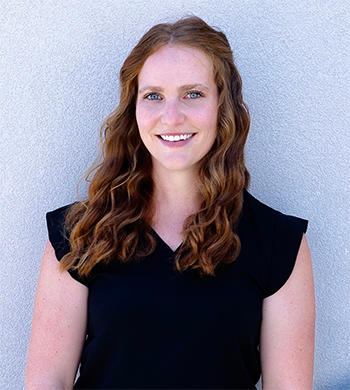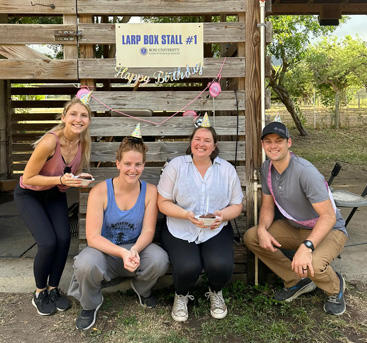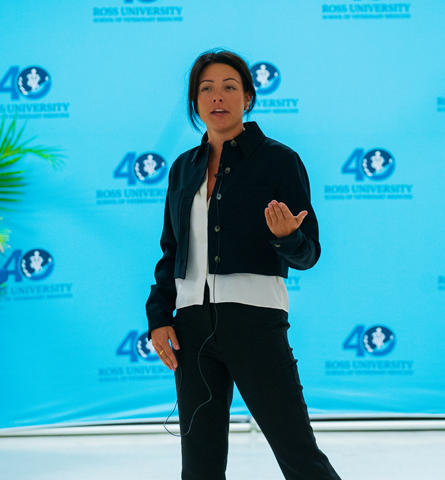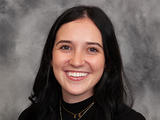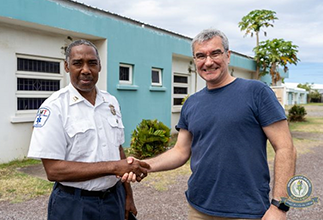Annually, the Foundation for Food and Agriculture Research (FFAR) and the American Association of Veterinary Medical Colleges (AAVMC) award veterinary student research fellowship opportunities to students around the world to conduct research advancing global food security, sustainable animal production, and environmental sustainability. Among the 13 recipients of a 2023 Fellowship is Ross University School of Veterinary Medicine’s (Ross Vet) Carla Joseph, class of ‘25, whose research project has the potential to help recover populations of endangered donkey breeds and become a practice of reproductive success in zoos.
“Veterinarians trained in animal science and public health are critical to addressing many global challenges within the veterinary and agricultural fields,” the FFAR said in their announcement. “Through the FFAR Vet Fellows program, veterinary students can pursue research outside of the biomedical sciences and gain experiential learning opportunities with a qualified mentor.”
Researchers have found through prior studies that donkeys artificially inseminated with frozen semen have low pregnancy rates due to uterine inflammation resulting from the procedure. Under the guidance of Lorenzo Segabinazzi, DVM, MS, PhD, assistant professor of theriogenology, and Sarah Hooper, DVM, MS, PhD, assistant professor of physiology at Ross Vet, Joseph is investigating whether donkey pregnancy rates could be improved by mitigating uterine inflammation using intrauterine infusions of platelet-rich plasma, commonly used to treat diverse inflammatory conditions.
The fellowship culminates with student presentations at the annual Veterinary Scholars Symposium August 3-5 in Puerto Rico, where Joseph will present the research team’s findings to global veterinarians.
“I’m really looking forward to the opportunity to present,” said Joseph. “I'm nervous for the first-ever symposium I’ll be attending, let alone presenting a poster of our research because I’ve never done anything like this before, but it’s all very exciting.”
EARLY PATH TO VETERINARY MEDICINE
Joseph’s inspiration to join Dr. Segabinazzi on his active research dates to her childhood growing up on a farm in Sinclair, Manitoba, Canada, where her family ran a mixed beef and grain farm growing crops and raising nearly 100 cattle. Living and working around cattle her whole life established a path to veterinary medicine early on, and she went on to study animal science at the University of Saskatchewan with a vision of applying to veterinary school shortly after.
While in school, Joseph continued building on her experience working with large animals at a dairy barn and spent about half her time living on the farm where she was working. After one year of work, she began interviewing with veterinary schools in Canada and Ireland, but Ross Vet’s opportunity as the only AVMA-accredited DVM Program offering three flexible start dates and a faster track to her DVM would allow Joseph to pursue her dream that had already been delayed by the pandemic.
RESEARCH AT ROSS VET
At Ross Vet, students are offered a range of opportunities to contribute to meaningful, real-world veterinary research experiences through intramural or extramural research projects led by faculty and staff on campus. Joseph began seeking out opportunities that would enhance her knowledge and skillset in large animal medicine, which introduced her to Dr. Segabinazzi’s work with donkeys.
“I’m interested in working with cattle in the future and although there were no active cattle projects, the opportunity to study reproduction in animals I had no prior experience with was a big learning opportunity and chance to extend myself to equids.”
Joseph and others collaborating on the project have been monitoring and managing the donkeys' pregnancy cycles to gather data summarized in a research paper. Every morning, the team conducts ultrasounds on a portion of the 16 jennies, depending on the stage of their estrous cycle, and may induce ovulation, breed the jennies, or perform other procedures like blood sampling, oxytocin injections, uterine cytology, uterine lavage, etc.
The project requires daily coordination between Dr. Segabinazzi, and his team of student research assistants and student volunteers as students balance their extracurricular research activities with their DVM program commitments.
“Time management becomes your best friend because you need it,” said Joseph. “Me and my other colleagues that are working on the project coordinate at the beginning of the month to know which days we're going to have, and we plan everything else around that. When certain things come up, for instance, traveling to Puerto Rico for the Veterinary Scholars Symposium, we learn to depend on each other. We've made our own little donkey family as we call it.”
RETURNING TO HER ROOTS
Now four semesters into her time at Ross Vet, Joseph has maintained her focus on becoming a large animal veterinarian, specifically in production medicine and genetics related to achieving better heart health and longevity of cattle. On top of her research and DVM curriculum, Joseph is also a teaching assistant and president of the American Association of Bovine Practitioners student club on campus. Her passion has always remained working with cows and staying involved with them wherever she can.
“When all is said and done, I would like to go back to a rural community because I grew up in one. Those communities are suffering for large animal veterinarians and veterinarians in general, and I would like to give back to a community that got me to this point.”
Joseph’s experience gained through her research project involvement has also ignited a passion for teaching, which she hopes she can return to further down the road.
“I’m a teaching assistant for Gross Anatomy 2 and am good at finding multiple ways to explain something or connect with someone,” she said. “With research, we have to train students in lower semesters to take over for us because research is ongoing and we’re only in St. Kitts for a certain amount of time. Our work here continues if we can teach it to someone else.”
Learn more about how you can become involved in ongoing, real-world research at Ross Vet here.



